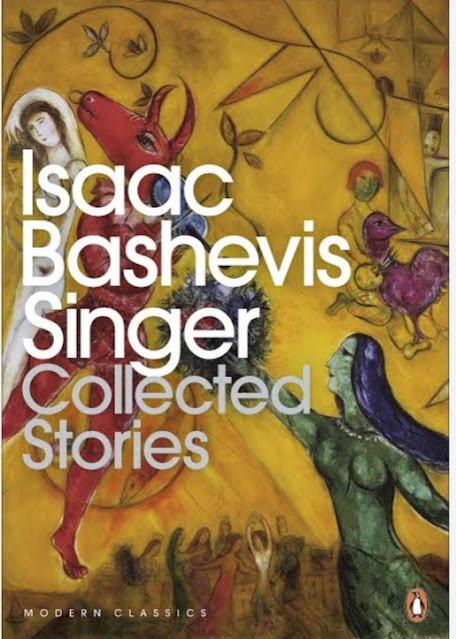The Gentleman from Cracow. By Issac Singer - Commentary; New York, N. Y. Vol. 24, (Jan 1, 1957) - A Short Story
In THE COMMUNITY HOUSE THERE WAS A PARCHMENT WITH A CHRONICLE ON IT, BUT THE FIRST PAGE WAS MISSING AND THE WRITING HAD FADED. ISAAC BASHEVIS SINGER, “THE GENTLEMAN FROM CRACOW” - quoted in The Lost: A Search for Six Million by Daniel Mendelsohn
Issac Singer (1902-1901-born Poland) won the Nobel Prize in 1986 for the full body of his work. He is best known to the public as the author of Yentil, the basis for a very popular movie. Singer's, even though he left Poland in 1935 because of the rise of the Nazis, work is very rooted in the culture in which he was raised. He became an American citizen. Singer died and is buried in Florida. . He indicated his biggest influences as a short story writer were Anton Chekhov and Guy de Maupassant
You may read the story on Commentary Website
It is included in The Collected Short Stories of Issac Singer
I have already posted on three of Singer's stories, I was motivated to read "The Gentleman from Cracowby the reference in MeMendelso's book.
The Gentleman from Cracow is one of the most famous of Singer's stories. Set in a town in Poland with a mixed population of Jews and Gentiles, it is a very exciting work going into ancient Ashkanazi beliefs.
I really do not want to at all spoil the plot of this gripping story. A 30 year old Jewish doctor, a widower arrives in Cracow. He is obviously very rich. Every matchmaker in town approaches him with a potential bride. He purposes a grand party be held in which all unmarried of age girls come along with eligible bachelors. He provides money for beautiful clothes and offers a huge dowry for every match made. The local Rabbi warns the people to be cautious but no one listens.
Then things turn very strange, very dangerous
The Gentleman from Cracow originally written in Yiddish, then translated under the supervision of Singer. I have no information besides this on the translation.
"Born in 1904 into a family of rabbis, Singer grew up in a devout household in Warsaw’s Jewish quarter, but he also spent time in the villages and market towns of eastern Poland, most notably Bilgoray, where he took refuge with his mother and brother during World War I. He had firsthand exposure to forms of Jewish folk culture that were destroyed by the Nazis, and many of his works testify to the richness of that annihilated world. In his stories set in Poland, Singer drew upon vernacular traditions for tales imbued with a wild, sometimes mischievous, often disturbing supernaturalism that was an outgrowth of local storytelling but containing dark undercurrents born of his own concerns and obsessions. At the same time, his skeptical but never dismissive engagement with religion and spirituality—and the opposing forces of secularism—enabled him to take part in the creative ferment of Jewish modernism but also distance himself from its politics and literary methods." From Library of America edition of his stories





No comments:
Post a Comment